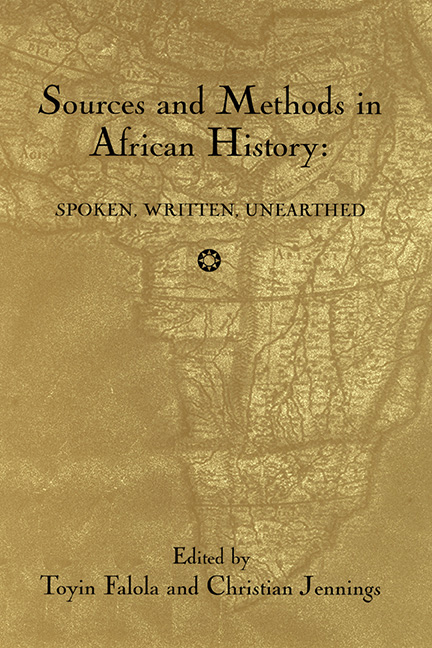Introduction
Published online by Cambridge University Press: 25 October 2017
Summary
Sources and methods have been an ongoing concern in African history since the early years of its development as a viable field of academic specialization. African scholars working at universities before and during the 1950s were aware of the strong traditions of oral historical consciousness developed in African societies over the course of centuries, but were constrained by the prevailing doubt and skepticism towards their use in historical research. Consequently, pioneer publications such as K. O. Dike's Trade and Politics in the Niger Delta and S. O. Biobaku's The Egba and Their Neighbours wrung as much information as possible from archival sources, while acknowledging the importance of oral sources and even using them to a limited extent. Still, they and other African historians were enthusiastic about the potential for nondocumentary sources to expand the scope of their studies dramatically, and set themselves to the task of establishing oral tradition as a “legitimate” source for historical research. Jan Vansina did much of the work of developing a formal methodology for collecting oral traditions, as evidenced by his highly influential Oral Tradition, published in English in 1961. African historians could now craft detailed historical narratives based on oral sources, such as Bethwell Ogot's History of the Southern Luo, or combine oral traditions with documentary sources, as in Yoruba Warfare in the Nineteenth Century by J. F. Ajayi and Robert Smith, and have their works recognized for the serious scholarly efforts they were. Oral tradition had the additional benefit of providing a counterpoint to written colonial documents, which were seen as “tainted” with their creators’ racism and cultural bias. Newly independent states in Africa were more than welcoming to such pro-African projects, and history departments across the continent set to the task of compiling nationalist narratives of their countries’ precolonial past, colonial experiences, and resistance struggles. Perhaps the archetypal example of this nationalist approach to African history was the Dar es Salaam faculty, which included Terence Ranger and Walter Rodney, but equally vibrant and optimistic groups of historians converged at Ibadan with Dike and Ajayi, at Dakar with Cheikh Anta Diop, and elsewhere across the continent.
- Type
- Chapter
- Information
- Sources and Methods in African HistorySpoken Written Unearthed, pp. xiii - xxiPublisher: Boydell & BrewerPrint publication year: 2003



